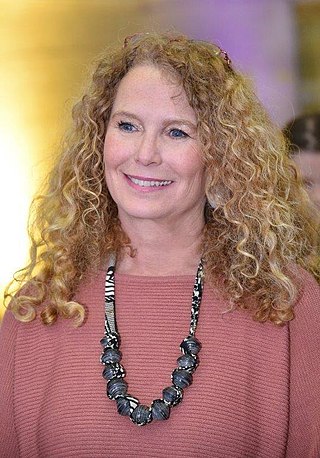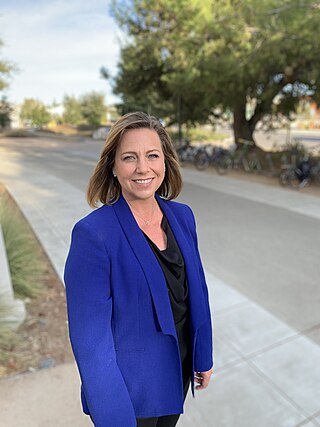Related Research Articles
Health impact assessment (HIA) is defined as "a combination of procedures, methods, and tools by which a policy, program, or project may be judged as to its potential effects on the health of a population, and the distribution of those effects within the population."
Eva Harris is a professor in the School of Public Health at the University of California, Berkeley, and the founder and president of the Sustainable Sciences Institute. She focuses her research efforts on combating diseases that primarily afflict people in developing nations.

Joseph W. Cullen was an American cancer prevention and rehabilitation researcher and briefly director of the AMC Cancer Research Center (1989-1990). He previously worked at the VA Hospital in Maryland (1968-1973), the National Institutes of Health (1973), the National Cancer Institute (NCI), and the Jonsson Comprehensive Cancer Center (1976-1982), holding high-level positions such as division director at several. He was a coordinator, creator, and researcher for the Smoking Tobacco and Cancer Program at the NCI, the largest anti-smoking campaign in the world at that time. Cullen wrote more than 90 publications in his lifetime, including four books.

The Health Initiative of the Americas is a Latino program focusing mainly on migrant and immigrant health issues. It is part of the School of Public Health at the University of California, Berkeley (UCB).
Marc B. Schenker is a professor of Public Health Sciences and Medicine at the University of California, Davis and the director of the Migration and Health Research Center (MAHRC).
Xóchitl is the Hispanicized version of "xōchitl," the Nahuatl word for flower is a given name that is somewhat common in Mexico and among Chicana/os for girls. The name has been a common Nahuatl name among Nahuas for hundreds of years. It was recorded on an early-16th century census of the Aztec people in the villages of Huitzillan and Quauchichinollan, where it was found to be the tenth most common name among boys. In a 1590 census, the boys name Xōchipepe was recorded, as well as the girls names of Ēlōxōchitl (magnolia), Miyāoaxōchitl, and Xīlōxōch (calliandra), which all draw from Xochitl.

Pierre Zalloua is a Lebanese biologist. His contributions to biology include numerous researches in genetic predisposition to diseases such as type 1 diabetes and β-thalassemia. He is most noted for taking part in the National Geographic Society's Genographic Project.

Lourdes Gutiérrez Nájera is an American cultural anthropologist. She is a tenured Associate Professor at Fairhaven College of Interdisciplinary Studies teaching in the American Cultural Studies curriculum. Her prior experience includes her work as assistant professor in the Department of Anthropology at both Dartmouth College and Drake University. She is a member of the Latin American Studies Association, American Anthropological Association, and Mujeres Activas en Letras y Cambio Social. Her research is published in journals and books such as Beyond El Barrio: Everyday Life in Latina/o America. Other publications include reviews of scholarly work. Her academic accomplishments and research pertain to the field of Latinx national migration, indigenous communities in the United States and Mexico, and the U.S.-Mexican borderlands.
Carolyn Sargent is a medical anthropologist.
Jon Andrus, an American physician, epidemiologist and immunization specialist, is the former deputy director of the Pan American Health Organization (PAHO).

Galia Sabar is the president of Ruppin Academic Center, one of Israel leading public colleges. Prior, she was a professor of African Studies at Tel Aviv University and the Chair of African Studies at the Department of Middle Eastern and African History at Tel Aviv University, where she also served as the coordinator of African Studies at the S. Daniel Abraham Center for International and Regional Studies. Sabar has published seven books and dozens of articles in professional journals. In addition to her academic research, Sabar has been a leading social activist in Israel mainly in relation to Ethiopian immigrants as well as in partnership with various NGOs assisting African labor migrants and asylum seekers. In May 2009, in recognition of her work combining academic rigor with social activism, Sabar received the Unsung Heroes of Compassion Award, sponsored by the international organization Wisdom in Action and delivered by the 14th Dalai Lama.

Xochitl Castaneda is the Founding Director of the Health Initiative of the Americas (HIA) at the School of Public Health, University of California (UC) Berkeley.
Currently, there are over 20 million immigrant women residing in the United States. The American Immigration Council states that the majority of these immigrant women come from Mexico, meaning that the main demographic of immigrant women in the U.S. are Latina. As the fastest growing minority group in America, Latinas are becoming primary influencers in education, economics and culture in American society and the consumer marketplace.

Elaine Ann Ostrander is an American geneticist at the National Human Genome Research Institute (NHGRI) of the National Institutes of Health (NIH) in Bethesda, Maryland. She holds a number of professional academic appointments, currently serving as Distinguished and Senior Investigator and head of the NHGRI Section of Comparative Genomics; and Chief of the Cancer Genetics and Comparative Genomics Branch. She is known for her research on prostate cancer susceptibility in humans and for conducting genetic investigations with the Canis familiaris —the domestic dog— model, which she has used to study disease susceptibility and frequency and other aspects of natural variation across mammals. In 2007, her laboratory showed that much of the variation in body size of domestic dogs is due to sequence changes in a single gene encoding a growth-promoting protein.

Seth M. Holmes is the Martin Sisters Endowed Chair Associate Professor of Medical Anthropology and Public Health at the University of California Berkeley. He also serves as founding co-chair of the Berkeley Center for Social Medicine, co-director of the MD/Ph.D. Track in Medical Anthropology coordinated between UC Berkeley and UCSF and is attending physician in the Department of Medicine in the Alameda County Medical Center. A cultural anthropologist and physician, Holmes focuses on social inequalities, immigration, ethnic hierarchies, health and health care. His work has provided a particularly strong ethnographic critique of behaviorism in medicine.
Chan Zuckerberg Biohub, or simply Biohub, is a nonprofit research organization. In addition to supporting and conducting original research, CZ Biohub acts as a hub and fosters science collaboration between UC Berkeley, UC San Francisco (UCSF) and Stanford. The Biohub’s medical science research center is funded by a $600 million contribution from Facebook CEO and founder Mark Zuckerberg and his wife Priscilla Chan. It is currently co-led by Stephen Quake and Joseph DeRisi. Gajus Worthington was named as Biohub's Chief Operating Officer in 2017 and Sandra Schmid joined as Chief Scientific Officer in 2020.
The Harvard Center for Population and Development Studies (HCPDS) is an interdisciplinary center at Harvard University, affiliated with the Harvard T.H. Chan School of Public Health.
Patricia Zavella is an anthropologist and professor at the University of California, Santa Cruz in the Latin American and Latino Studies department. She has spent a career advancing Latina and Chicana feminism through her scholarship, teaching, and activism. She was president of the Association of Latina and Latino Anthropologists and has served on the executive board of the American Anthropological Association. In 2016, Zavella received the American Anthropological Association's award from the Committee on Gender Equity in Anthropology to recognize her career studying gender discrimination. The awards committee said Zavella’s career accomplishments advancing the status of women, and especially Latina and Chicana women have been exceptional. She has made critical contributions to understanding how gender, race, nation, and class intersect in specific contexts through her scholarship, teaching, advocacy, and mentorship. Zavella’s research focuses on migration, gender and health in Latina/o communities, Latino families in transition, feminist studies, and ethnographic research methods. She has worked on many collaborative projects, including an ongoing partnership with Xóchitl Castañeda where she wrote four articles some were in English and others in Spanish. The Society for the Anthropology of North America awarded Zavella the Distinguished Career Achievement in the Critical Study of North America Award in the year 2010. She has published many books including, most recently, "I'm Neither Here Nor There, Mexicans"Quotidian Struggles with Migration and Poverty, which focuses on working class Mexican Americans struggle for agency and identity in Santa Cruz County.

Jonna Ann Keener Mazet is an American epidemiologist and Executive Director of the University of California, Davis One Health Institute. Recognized for her innovative and holistic approach to emerging environmental and global health threats, she is an elected member of the National Academy of Medicine and a fellow of the American Association for the Advancement of Science. Mazet is a professor of Epidemiology and Disease Ecology at the UC Davis School of Veterinary Medicine, where she focuses on global health problem solving, especially for emerging infectious disease and conservation challenges.

Raymond L. Rodriguez is an American professor of biology, specializing in molecular biology, genomics and biotechnology. His current research interests include diet-genome interactions, plant-made pharmaceuticals and the food/brain axis. Rodriguez is also an inventor, and entrepreneur. His research at the University of California, San Francisco in the 1970’s helped lay the foundation for the biotechnology industry. He also holds several issued US patents. He is involved in programs that promote diversity, equity and inclusion for women and underrepresented minorities in science, technology, engineering, and mathematics (STEM) disciplines.
References
- ↑ "HIA - Training and Exchange: Summer Institute on Migration and Health". Archived from the original on 2010-04-11. Retrieved 2009-09-01., MAHRC Information Page.
- ↑ Archived 2006-06-22 at the Wayback Machine , Marc Schenker University Information Page.
- ↑ "HIA - Our Staff". Archived from the original on 2010-06-23. Retrieved 2009-08-18., HIA: Our Staff.
- 1 2 MAHRC Press Release, August 2009.
- ↑ Health Initiative of the Americas Wikipedia Page.